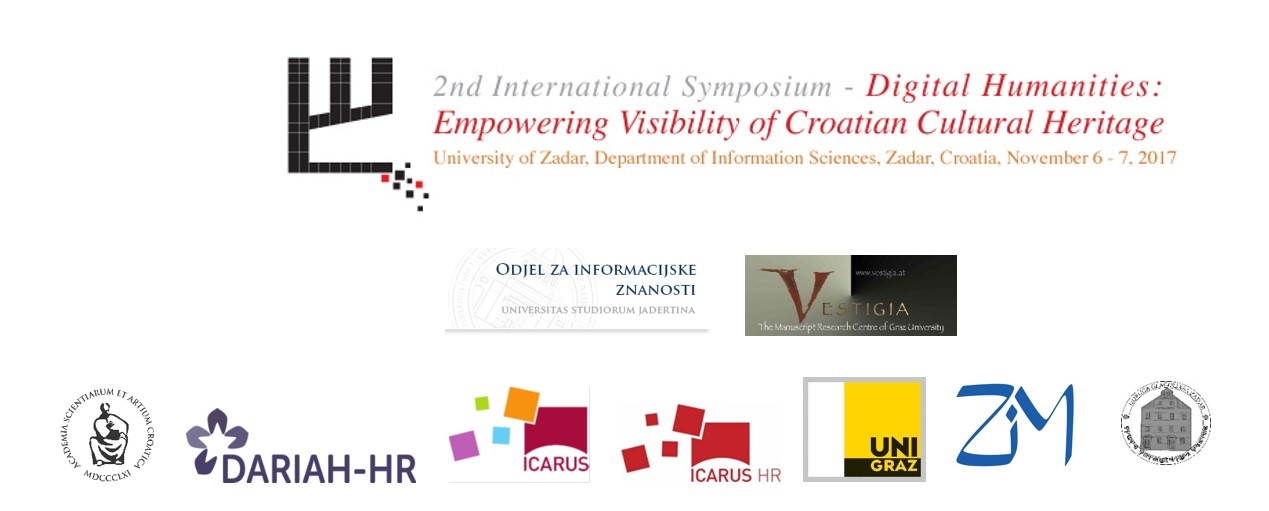2nd International Symposium Digital Humanities: Empowering Visibility of Croatian Cultural Heritage
 Main organizers:
Main organizers:
Department of Information Sciences University of Zadar, Croatia
Vestigia Manuscript Research Centre University of Graz, Austria
Co-organizers:
Croatian Academy of Science and Art, Zadar, Croatia
Austrian Centre for Digital Humanities, University of Graz, Austria
ICARUS
ICARUS-HR
DARIAH-HR
Glagolitic Association Zadar, Croatia
Date: November 6 – 8, 2017
Place: University of Zadar, Croatia
Organized within the project
Digitization, bibliographic description and research of texts written in Glagolitic, Croatian Cyrillic and Latin scripts until the end of the 19th century in the Zadar and Šibenik area
Financially supported by
the Ministry of Culture of the Republic of Croatia
The International Symposium on Digital Humanities: Empowering Visibility of Croatian Cultural Heritage is the continuation of the 1st Symposium held in October 2016 under the title Creative Potential of Glagolitic Heritage. These symposiums are part of the scientific activities related to the project Digitization, bibliographic description and research of texts written in Glagolitic, Croatian Cyrillic and Latin scripts until the end of the 19th century in the Zadar and Šibenik area, which is organized by the Department of Information Sciences of the University of Zadar and Vestigia Manuscript Research Centre of the University of Graz and is supported by the Ministry of Culture of the Republic of Croatia. Since the project is mainly focused on the digitization of Glagolitic heritage, and therefore a large number of topics related to Glagolism is expected, the symposium is included in the Year of the Glagolitic Script declared by the Zadar County.
The purpose of the Symposium is to cover topics from the areas defining and questioning digital humanities as a new science, as well as the description, research and access to cultural heritage in the digital environment, national and local guidelines and documents related to the digitization of cultural heritage, creative usage of cultural heritage, cultural tourism and including the community into the research of cultural heritage. Particular emphasis is placed on the presentation of methods and research results of cultural heritage, especially written heritage, namely manuscripts and old books and its fragments and watermarks, but also the research in archeology, underwater archeology, art history, linguistics, classical philology, philology, applied arts, etc.
In the context of reflection on the future of research in the field of humanities, starting from the tradition which the University of Zadar nurtures in the field of humanities, the aim of this Symposium is to present research methods and tools from as many fields and branches of the humanities, but also other fields, in order to identify the main research approaches, areas of cooperation within the humanities and other fields, and start a discussion about the need to develop an institutional or cross-institutional center for digital humanities at the University of Zadar.
Suggested topics:
- Digital humanities as a contemporary cultural heritage research framework: definitions, approaches, institutionalization, education
- Studying users in digital humanities
- Cross-institutional cooperation and interdisciplinarity in the area of research and interpretation of cultural heritage
- Methods and tools for cultural heritage research in the digital age: visualization of information, GIS, research data in humanities
- Digitization of cultural heritage: practices, guidelines, documents, programs, criteria
- Description and access to cultural heritage: conceptual models, standards and cataloguing rules
- Manuscripts, fragments and watermarks: digitization, description and research
- Glagolitic, Cyrillic and Latin written heritage as a source for historiographic and linguistic research
- Creative use of cultural heritage: promotion, cultural tourism, popularization and including the community in cultural heritage research (crowdsourcing, crowdfunding)